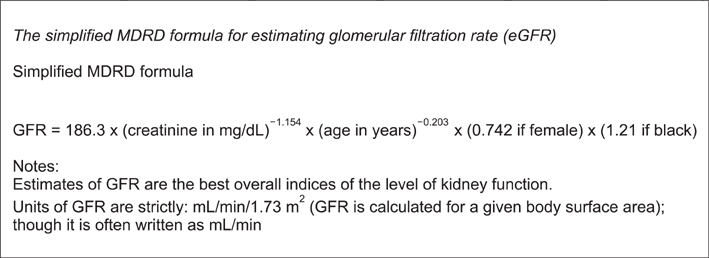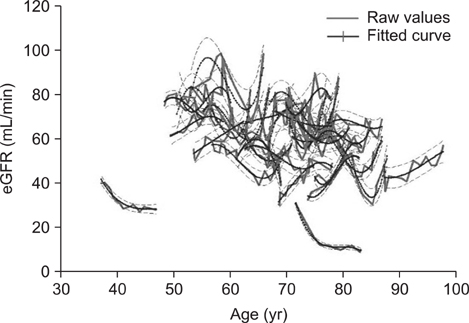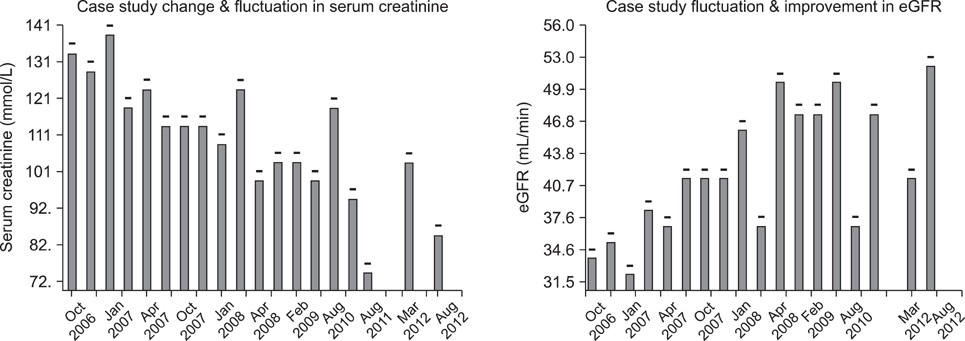Healthc Inform Res.
2013 Mar;19(1):9-15. 10.4258/hir.2013.19.1.9.
Informatics as Tool for Quality Improvement: Rapid Implementation of Guidance for the Management of Chronic Kidney Disease in England as an Exemplar
- Affiliations
-
- 1Department of Health Care Management and Policy, University of Surrey, Guildford, UK. s.lusignan@surrey.ac.uk
- KMID: 2166654
- DOI: http://doi.org/10.4258/hir.2013.19.1.9
Abstract
OBJECTIVES
Chronic kidney disease (CKD) is an important cause of excess cardiovascular mortality and morbidity; as well as being associated with progression to end stage renal disease. This condition was largely unheard of in English primary care prior to the introduction of pay-for-performance targets for management in 2006. A realist review of how informatics has been a mechanism for national implementation of guidance for the improved management of CKD.
METHODS
Realist review of context, the English National Health Service with a drive to implement explicit national quality standards; mechanism, the informatics infrastructure and its alignment with policy objectives; and outcomes are describe at the micro-data and messaging, meso-patient care and quality improvement initiatives, and marco-national policy levels.
RESULTS
At the micro-level computerised medical records can be used to reliably identify people with CKD; though differences in creatinine assays, fluctuation in renal function, and errors in diabetes coding were less well understood. At the meso-level more aggressive management of blood pressure (BP) in individual patients appears to slow or reverse decline in renal function; technology can support case finding and quality improvement at the general practice level. At the macro-level informaticians can help ensure that leverage from informatics is incorporated in policy, and ecological investigations inform if there is any association with improved health outcomes.
CONCLUSIONS
In the right policy context informatics appears to be an enabler of rapid quality improvement. However, a causal relationship or generalisability of these findings has not been demonstrated.
Keyword
MeSH Terms
-
Blood Pressure
Clinical Coding
Creatinine
Diabetes Mellitus
Dietary Sucrose
England
General Practice
Health Policy
Humans
Informatics
Kidney Failure, Chronic
Kidney Function Tests
Medical Informatics
Medical Records
Medical Records Systems, Computerized
National Health Programs
Primary Health Care
Quality Improvement
Quality of Health Care
Renal Insufficiency
Renal Insufficiency, Chronic
Creatinine
Dietary Sucrose
Figure
Cited by 1 articles
-
Machine Learning to Compare Frequent Medical Problems of African American and Caucasian Diabetic Kidney Patients
Yong-Mi Kim, Pranay Kathuria, Dursun Delen
Healthc Inform Res. 2017;23(4):241-248. doi: 10.4258/hir.2017.23.4.241.
Reference
-
1. Herzog CA, Asinger RW, Berger AK, Charytan DM, Diez J, Hart RG, et al. Cardiovascular disease in chronic kidney disease. A clinical update from Kidney Disease: Improving Global Outcomes (KDIGO). Kidney Int. 2011. 80(6):572–586.
Article2. Weiss JW, Johnson ES, Petrik A, Smith DH, Yang X, Thorp ML. Systolic blood pressure and mortality among older community-dwelling adults with CKD. Am J Kidney Dis. 2010. 56(6):1062–1071.
Article3. Eriksen BO, Ingebretsen OC. The progression of chronic kidney disease: a 10-year population-based study of the effects of gender and age. Kidney Int. 2006. 69(2):375–382.
Article4. de Lusignan S, Tomson C, Harris K, van Vlymen J, Gallagher H. Creatinine fluctuation has a greater effect than the formula to estimate glomerular filtration rate on the prevalence of chronic kidney disease. Nephron Clin Pract. 2011. 117(3):c213–c224.
Article5. O'Seaghdha CM, Hwang SJ, Upadhyay A, Meigs JB, Fox CS. Predictors of incident albuminuria in the Framingham Offspring cohort. Am J Kidney Dis. 2010. 56(5):852–860.6. Gallagher H, de Lusignan S, Harris K, Cates C. Quality-improvement strategies for the management of hypertension in chronic kidney disease in primary care: a systematic review. Br J Gen Pract. 2010. 60(575):e258–e265.
Article7. Richards N, Harris K, Whitfield M, O'Donoghue D, Lewis R, Mansell M, et al. Primary care-based disease management of chronic kidney disease (CKD), based on estimated glomerular filtration rate (eGFR) reporting, improves patient outcomes. Nephrol Dial Transplant. 2008. 23(2):549–555.
Article8. Klebe B, Irving J, Stevens PE, O'Donoghue DJ, de Lusignan S, Cooley R, et al. The cost of implementing UK guidelines for the management of chronic kidney disease. Nephrol Dial Transplant. 2007. 22(9):2504–2512.
Article9. Couser WG, Remuzzi G, Mendis S, Tonelli M. The contribution of chronic kidney disease to the global burden of major noncommunicable diseases. Kidney Int. 2011. 80(12):1258–1270.
Article10. Swindells M, de Lusignan S. Lessons from the English National Programme for IT about structure, process and utility. Stud Health Technol Inform. 2012. 174:17–22.11. Kumarapeli P, de Lusignan S. Using the computer in the clinical consultation; setting the stage, reviewing, recording, and taking actions: multi-channel video study. J Am Med Inform Assoc. 2012. 12. 15. [Epub]. http://dx.doi.org/10.1136/amiajnl-2012-001081.
Article12. Schade CP, Sullivan FM, de Lusignan S, Madeley J. e-Prescribing, efficiency, quality: lessons from the computerization of UK family practice. J Am Med Inform Assoc. 2006. 13(5):470–475.
Article13. de Lusignan S, Chan T. The development of primary care information technology in the United Kingdom. J Ambul Care Manage. 2008. 31(3):201–210.
Article14. Michalakidis G, Kumarapeli P, Ring A, van Vlymen J, Krause P, de Lusignan S. A system for solution-orientated reporting of errors associated with the extraction of routinely collected clinical data for research and quality improvement. Stud Health Technol Inform. 2010. 160(Pt 1):724–728.15. van Vlymen J, de Lusignan S, Hague N, Chan T, Dzregah B. Ensuring the Quality of Aggregated General Practice Data: Lessons from the Primary Care Data Quality Programme (PCDQ). Stud Health Technol Inform. 2005. 116:1010–1015.16. de Lusignan S, Liaw ST, Michalakidis G, Jones S. Defining datasets and creating data dictionaries for quality improvement and research in chronic disease using routinely collected data: an ontology-driven approach. Inform Prim Care. 2011. 19(3):127–134.
Article17. Pawson R. Evidence-based policy: a realist perspective. 2006. Thousand Oaks (CA): Sage.18. Donabedian A. Evaluating the quality of medical care. Milbank Mem Fund Q. 1966. 44(3):Suppl:166–Suppl:206.
Article19. de Lusignan S, Pearce C, Shaw NT, Liaw ST, Michalakidis G, Vicente MT, et al. What are the barriers to conducting international research using routinely collected primary care data? Stud Health Technol Inform. 2011. 165:135–140.20. de Lusignan S, Krause P, Michalakidis G, Vicente MT, Thompson S, McGilchrist M, et al. Business process modelling is an essential part of a requirements analysis. Contribution of EFMI Primary Care Working Group. Yearb Med Inform. 2012. 7(1):34–43.21. National Kidney Foundation. K/DOQI clinical practice guidelines for chronic kidney disease: evaluation, classification, and stratification. Am J Kidney Dis. 2002. 39:2 Suppl 1. S1–S266.22. de Lusignan S, Gallagher H, Chan T, Thomas N, van Vlymen J, Nation M, et al. The QICKD study protocol: a cluster randomised trial to compare quality improvement interventions to lower systolic BP in chronic kidney disease (CKD) in primary care. Implement Sci. 2009. 4:39.
Article23. de Lusignan S, Chan T, Stevens P, O'Donoghue D, Hague N, Dzregah B, et al. Identifying patients with chronic kidney disease from general practice computer records. Fam Pract. 2005. 22(3):234–241.
Article24. Stevens PE, O'Donoghue DJ, de Lusignan S, Van Vlymen J, Klebe B, Middleton R, et al. Chronic kidney disease management in the United Kingdom: NEOERICA project results. Kidney Int. 2007. 72(1):92–99.
Article25. Dhoul N, de Lusignan S, Dmitrieva O, Stevens P, O'Donoghue D. Quality achievement and disease prevalence in primary care predicts regional variation in renal replacement therapy (RRT) incidence: an ecological study. Nephrol Dial Transplant. 2012. 27(2):739–746.
Article26. Levey AS, Bosch JP, Lewis JB, Greene T, Rogers N, Roth D. A more accurate method to estimate glomerular filtration rate from serum creatinine: a new prediction equation. Modification of Diet in Renal Disease Study Group. Ann Intern Med. 1999. 130(6):461–470.
Article27. Kumarapeli P, Stepaniuk R, de Lusignan S, Williams R, Rowlands G. Ethnicity recording in general practice computer systems. J Public Health (Oxf). 2006. 28(3):283–287.
Article28. Anandarajah S, Tai T, de Lusignan S, Stevens P, O'Donoghue D, Walker M, et al. The validity of searching routinely collected general practice computer data to identify patients with chronic kidney disease (CKD): a manual review of 500 medical records. Nephrol Dial Transplant. 2005. 20(10):2089–2096.
Article29. Lamb EJ, Vickery S, Dalton RN, Stevens PE. Estimating GFR with ID-MS traceable creatinine assays. Ann Clin Biochem. 2006. 43(Pt 4):327.
Article30. Poh N, de Lusignan S. Data-modelling and visualisation in chronic kidney disease (CKD): a step towards personalised medicine. Inform Prim Care. 2011. 19(2):57–63.
Article31. de Lusignan S, Khunti K, Belsey J, Hattersley A, van Vlymen J, Gallagher H, et al. A method of identifying and correcting miscoding, misclassification and misdiagnosis in diabetes: a pilot and validation study of routinely collected data. Diabet Med. 2010. 27(2):203–209.
Article32. de Lusignan S, Sadek N, Mulnier H, Tahir A, Russell-Jones D, Khunti K. Miscoding, misclassification and misdiagnosis of diabetes in primary care. Diabet Med. 2012. 29(2):181–189.
Article33. Hassan Sadek N, Sadek AR, Tahir A, Khunti K, Desombre T, de Lusignan S. Evaluating tools to support a new practical classification of diabetes: excellent control may represent misdiagnosis and omission from disease registers is associated with worse control. Int J Clin Pract. 2012. 66(9):874–882.
Article34. Alsanjari ON, de Lusignan S, van Vlymen J, Gallagher H, Millett C, Harris K, et al. Trends and transient change in end-digit preference in blood pressure recording: studies of sequential and longitudinal collected primary care data. Int J Clin Pract. 2012. 66(1):37–43.
Article35. Kumarapeli P, de Lusignan S, Robinson J. Online resources for chronic kidney disease (CKD) for primary care. Inform Prim Care. 2006. 14(2):139–142.
Article36. Crinson I, Gallagher H, Thomas N, de Lusignan S. How ready is general practice to improve quality in chronic kidney disease a diagnostic analysis. Br J Gen Pract. 2010. 60(575):403–409.
Article37. de Lusignan S, Nitsch D, Belsey J, Kumarapeli P, Vamos EP, Majeed A, et al. Disparities in testing for renal function in UK primary care: cross-sectional study. Fam Pract. 2011. 28(6):638–646.
Article38. Tahir MA, Dmitrieva O, de Lusignan S, van Vlymen J, Chan T, Golmohamad R, et al. Confidence and quality in managing CKD compared with other cardiovascular diseases and diabetes mellitus: a linked study of questionnaire and routine primary care data. BMC Fam Pract. 2011. 12:83.
Article39. de Lusignana S, Gallagher H, Jones S, Chan T, van Vlymen J, Tahir A, et al. Audit-based education lowers systolic blood pressure in chronic kidney disease: the Quality Improvement in CKD (QICKD) trial results. Kidney Int. 2013. 03. 27. [Epub] http://dx.doi.org/10.1038/ki.2013.96.
Article40. Department of Health. National Service Framework for Renal Services. Part Two: chronic kidney disease acute renal failure and end of life care. 2005. London: Department of Health.41. National Collaborating Centre for Chronic Conditions. Chronic kidney disease: national clinical guideline for early identification and management in adults in primary and secondary care. 2008. London: Royal College of Physicians.42. de Lusignan S, Gallagher H, Stevens P, Harris K, Dmitrieva O, Tahir A, et al. Chronic kidney disease frequently asked questions. 2007. 3rd ed. London: NHS Employers/BMA.43. Stevens PE, de Lusignan S, Farmer CK, Tomson CR. Engaging primary care in CKD initiatives: the UK experience. Nephrol Dial Transplant. 2012. 27:Suppl 3. iii5–iii11.
Article44. Berg M. Implementing information systems in health care organizations: myths and challenges. Int J Med Inform. 2001. 64(2-3):143–156.
Article
- Full Text Links
- Actions
-
Cited
- CITED
-
- Close
- Share
- Similar articles
-
- Personalized nutritional management in the transition from non-dialysis dependent chronic kidney disease to dialysis
- Strategies for successful implementation and permanent maintenance of a rapid response system
- Implementation of a care coordination system for chronic diseases
- Management of autosomal dominant polycystic kidney disease in the era of disease-modifying treatment options
- Nutritional Intervention for a Patient with Diabetic Nephropathy




